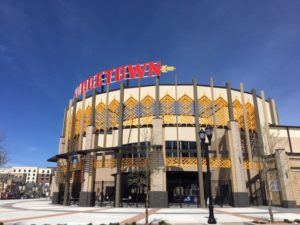Most of us have life experiences that stick with us, well, forever.
I’ve had the usual experiences: marriage to a wonderful girl, producing two wonderful sons who’ve grown into fine men, wearing my country’s uniform during a time of war, embarking on a rewarding career that has taken me to places I never imagined seeing.
Another one stands out. It’s a rare event that occurred five years ago this week. It was when four young people and I boarded an airplane for Israel. We were part of an extraordinary adventure. We spent four weeks in the Holy Land, touring one of the world’s most interesting countries from top to bottom. We lived with families and became, at one level, part of their families — if only briefly. We weren’t tourists. Thus, we saw more of a fascinating place than most people ever get to see.
***
I am a member of the Rotary Club of Amarillo. Our Rotary district had set up an exchange with another Rotary district in Israel. Our district needed a Rotary member to lead a team of four non-Rotarians on this exchange. I was one of several Rotarians who interviewed for the team leader spot. The interview took place in the fall of 2008 and the committee assigned to consider the applicants chose yours truly to lead the team.
I was stunned.
Then we got to work picking a team. They would comprise four individuals ages 25 to 40. We found four outstanding young professionals who had their employers’ blessing to take four weeks off to learn from their peers in Israel.
The program is called Group Study Exchange and its aim is manyfold: It’s meant to build relationships among nations in a people-to-people way; it exposes professionals to like-minded folks in other countries; and it helps build interest in Rotary, encouraging team members to join Rotary and become active in their own communities.
Three young women and a young man formed the team and together we began to prepare for this journey. They are Katt Krause of Amarillo, who was office manager for her family landscape contractor business; Aida Almaraz Nino of Hereford, who was a social worker at Boys Ranch; Fernando Valle of Lubbock teaches post-graduate courses for school administrators at Texas Tech University; and Shirley Davis of Levelland, teaches math at South Plains College.
We prepped for several weeks, meeting mostly in Lubbock. We learned about Israelis culture. We talked about the do’s and don’ts of embarking on a journey such as this. We prepared our presentation that we would deliver to host Rotary clubs.
At one point during our preparation, violence broke out in Gaza; Israel responded with a heavy counterattack against terrorists who were throwing missiles and mortars at cities in southern Israel. There was a serious thought that the trip might be canceled because of security concerns. The Israelis, as they usually do, put down the violence. The trip was on.
Then the day came to depart. It was May 9, 2009. Our flight was long and grueling, but we landed at David Ben-Gurion International Airport and were greeted by our Rotary hosts and by another GSE team, from The Netherlands, with whom we would travel for the next four weeks.
Our adventure exposed us to so many treasures. We were shown Christian, Jewish and Muslim holy sites. We went deep into the Judean Desert. We walked among the ruins of Masada. We swam in the Dead Sea. We went to Nazareth. We swam in the Mediterranean Sea. We looked out over the Red Sea at Eilat. We saw antiquities all along the way.
Our journey ended with a Rotary district meeting in Jerusalem, the holiest of the holy cities in Israel. We received a spontaneous prayer from an American monk on the Mount of Olives. We walked through the Old City. We saw the Holocaust museum at Yad Vashem.
Our hearts were broken and filled with joy all at the same time.
The families that greeted us, housed us, entertained us and showed us their country became our friends.
***
The most rewarding part of the trip arguably is the friendships I forged with the young people with whom I was given the honor to accompany on this magnificent experience.
I pretty much think about different parts of our trip daily. Random parts that have to do with my day. Dead Sea, Masada, advice and conversations with hosts I had, inside jokes, beautiful sites. I gained so much from our adventure. It helped me grow and learn a lot about who I am. I love Rotary and what it gave to me. It’s an amazing organization, and on our trip we truly witnessed the 4-Way Test.
I will be forever grateful to Rotary International for what it gave to me. — Katt Krause.
We laughed at each other’s jokes and found ways to lighten the mood whenever we could.
The Dead Sea trip, basking in the sun and salt water while feeling the burn sensation of the exfoliation, peeling layers of skin and any scabs I may have had. Also, the total body mud masks that everyone participated in that temporarily changed our identities to that of an aboriginal warrior. — Shirley Davis.
It moved us beyond measure in ways that occasionally sneaked up on us.
Living and seeing life through the Israelis’ eyes was an experience that will, for sure, never be forgotten. One of the best moments, for me, was during our last days in Jerusalem. Walking where Jesus walked. We had traveled Israel for almost a month without seeing a drop of rain, and the moment when the monk prayed with us and for that short moment … it sprinkled! Rain over us! That was absolutely amazing! Loving the people and being loved by them, also, was an experience that’s sometimes hard to explain. I will always feel a special bond with the family I traveled with and the family I made while in Israel. — Aida Nino.
We built relationships that we all believe will last a lifetime.
Even though five years have passed, the emotional connections made with Rotarians and their families in Israel are as vivid as the country. We experienced more than hospitality, as a GSE team we were afforded rich cultural experiences and real daily life of the country. I will never forget walking through Jerusalem, shedding tears next to a family at Yad Vashem, eating with a host family or spending the day with the GSE team in the Red Sea off the coast of Eilat. Be’er Sheva welcomed us with open arms and Haifa and Tel Aviv showed us where Israel has been and where it is headed. GSE and Rotary afforded me an opportunity to understand and appreciate people across the world, especially the warmth of humanity. I am forever grateful for the experience. I went on a trip to Israel with a newly formed GSE team and came back with more than friends. I came back with a family. — Fernando Valle.
I have maintained contact with a couple of the Dutch GSE team members in the years since that amazing journey. Although we don’t see each other as much as I would like — and I assume the others as well — I consider all four of my fellow West Texans among my very best friends in this world.
We shared an experience few folks can understand fully. Perhaps other GSE teams that ventured to other far-off lands understand how it is.
This one was for the books. I am grateful beyond measure for the experience it provided to me and for the friendships it has built.
What a journey it was.




